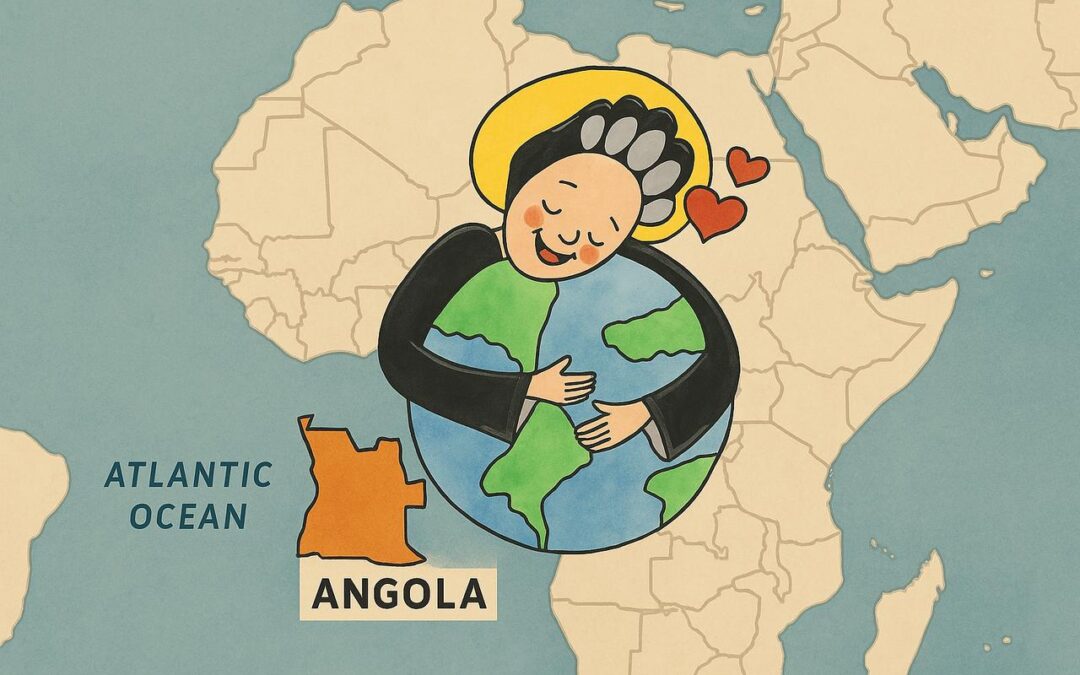The Canossian Support at a Distance (SAD) is, at heart, a covenant of trust: a steady, person-to-person commitment that helps a child grow, learn and receive care in his or her own country. It is not a vague donation; it is a long-term accompaniment that prizes dignity, continuity and practical impact, woven together with local communities, Canossian schools and the Canossian Sisters themselves.
Today we travel to Angola, where this covenant changes lives in ways both quiet and profound. We do so through the eyes and voices of Mother Bruna and Mother Maria Carla — two women that pour and dedicate their vocation here.
Angola, the Atlantic and red dust: the part the statistics miss
Luanda lies along the ocean like a bright crescent: a luminous bay; the Ilha, with its low houses and fish stalls; then streets that climb inland towards neighbourhoods where running water is uncertain and the electricity flickers. The air tastes of salt; farther in, the red dust rises with every passing minibus.
The country is rich in natural resources, yet the families face another reality: low incomes, fast-rising prices, fragile public services. Between the glossy seafront towers and the musseques — the informal settlements inland — runs a narrow frontier that many mothers cross each morning, hoping to “make the day” by selling produce from their small plots at open-air markets.
1994: Mother Bruna and the beginnings at Gol Sapù
In 1994 the Canossians were invited by the Apostolic Nuncio in Luanda (formerly of São Tomé) to found a new mission in the capital. Angola and São Tomé, once Portuguese colonies, both became independent in 1975: the island soon found peace; Angola’s civil war would grind on for years. The Sisters first established a presence in Bairro Cassenda, a few hundred metres from the airport.
Their destination was Gol Sapù, then a vast, near-empty periphery. Thousands of people fleeing provincial fighting arrived and built with whatever they had: branches, wood, corrugated metal — and later hand-pressed blocks of cement and red earth, dried in the sun to make four walls, a door and a window. On the plot entrusted to the Canossians, a perimeter wall went up with a watchman to protect it.
The school grew literally from the ground up. At first, children sat on the earth for a few hours of meeting and instruction while a Sister shuttled daily from the city. Shipping containers became classrooms; lean-to roofs were added against the wall as numbers swelled: 300, 600, 800… until work began on the first ten-classroom block. With providence — and the help of a laywoman from Villafranca (VR) — a nursery school opened: first the pre-primary, then classes for four- and three-year-olds.
Primary expanded from Year 1 to Year 6, then to Year 9; today the school reaches Year 12, with pupils ready for university. There are around 2,000 students — a lively hum of youth facing the future. The school is named St Josephine Bakhita, that African saint known as the “Universal Sister”, who, with St Magdalene of Canossa, is asked to guard and sustain the work.
Over the years, providence has continued to sustain this reality through freewill offerings and Sostegno a Distanza — individual and group.
“Ordinarily, a person’s conduct throughout life depends upon education.”
— St Magdalene of Canossa
Voices from the field
“We keep a list of one hundred families in constant need: each month there is a food parcel; then we start again, seeking solutions for the sick, for school, for the elderly without pensions.”
— Mother Maria Carla Panzeri, Luanda
“Support is not merely a school fee. It is time, attentiveness, continuity. We know the names and the stories; we watch over attendance; we build a network with the mothers.”
— Mother Bruna Nicolodi
Life on €40 a month
Here, €40 per month can be the only wage — enough for a sack of rice or fuba, but little else. A mother may have to choose between fees and medicine; a child may stay out of school for lack of a uniform and exercise books; an elderly woman may forgo treatment because the hospital requires materials and drugs to be bought separately.
Grandmothers hold families together when parents cannot. Street markets are the daily oxygen. The churches are full of young people — and so, too, is the effort: long walks for water, hours in queues, crowded transport. Threaded through are simple hopes: “that my daughter studies”, “that my son learns a trade”.
Where Sostegno a Distanza makes the difference — in practice
- Schooling:enrolment fees, materials, uniform — and, crucially, steady accompaniment: attendance, catch-up work, light tutoring.
- Nutrition:a monthly food parcel for the most vulnerable households, prioritising single mothers and families with elderly dependants.
- Basic health:medical visits, essential medicines, and assistance in case of hospitalisation.
- Family stability:micro-support to prevent debts that would push children out of school.
- Educational network:partnership with the Bakhita School and parish communities to know each story, follow each child over time, and build a steadier future.
“Great means are not required — constancy is. One step at a time, and always.”
— Mother Bruna Nicolodi
Further reading
To explore in detail how the Canossian Support at a Distance operates in Luanda, to read more first-hand accounts and to consult project data, please visit: HERE








